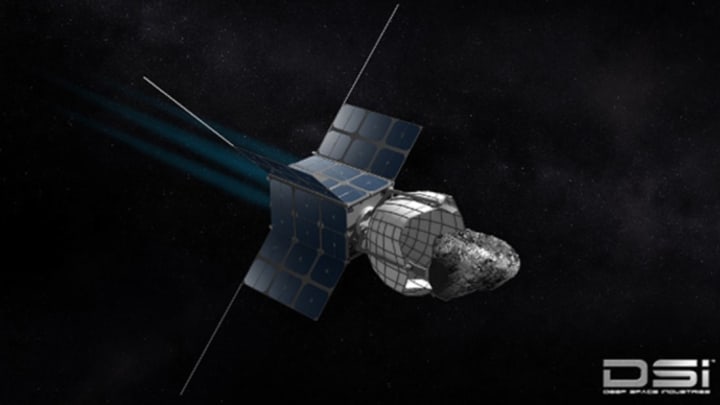By Chris Gayomali
Brace yourselves for the coming asteroid gold rush. U.S. company Deep Space Industries this week revealed plans to send spacecraft on missions to mine near-Earth asteroids for precious metals. According to the announcement, the company plans to dispatch a series of small, low-cost satellites by 2015. A year later, a larger spacecraft equipped with mining tools will land on any potentially lucrative space rocks to dig out the goods. The mission, says chairman Rick Tumlinson, would tap into resources necessary to "expand the civilization of Earth out into the cosmos ad infinitum."
How would it work? The company is hoping to fly two tiny prospecting probes — FireFly and DragonFly, both of which weigh less than 75 pounds — into space. To save on costs, these vessels would piggyback on the launches of larger communications satellites. Once airborne, FireFly and DragonFly would then spend half a year buzzing around asteroids to collect rock samples.
According to some estimates, it's easier to reach some 1,700 asteroids than it is to fly to the moon; each one of those asteroids could contain valuable materials like platinum, gold, and other rare-earth minerals. Because it's so difficult to get expensive materials such as these into space in the first place, the asteroid scraps might even be used to assemble parts for space stations or spacecraft. The Guardian explains:
One long-term idea is to build a space-borne manufacturing facility that takes in asteroid material, processes it into usable alloys and other substances, and makes objects with the material via a 3D printer. [Guardian]
Some critics question whether harvesting space materials is a financially sound investment. NASA, for example, is reportedly considering a new mission proposed by the Keck Institute for Space Studies that would send a robotic spacecraft to tow a small asteroid into the moon's orbit. Total cost: $2.6 billion.
Just last year, film director James Cameron, Google executives Eric Schmidt and Larry Page, and other wealthy investors revealed similarly ambitious plans for a separate asteroid-mining venture. Apparently, they see dollar signs in the stars, too.
